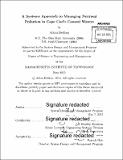A systems approach to managing nutrient pollution in Cape Cod's coastal waters
Author(s)
Delibas, Adem, 1980-
DownloadFull printable version (12.95Mb)
Other Contributors
System Design and Management Program.
Advisor
J. Bradley Morrison.
Terms of use
Metadata
Show full item recordAbstract
Pressing problems are facing the coastal waters of the world due to the growing human activity. Increasing population and economic development around coastal areas have left many embayments throughout the world severely impaired. Excessive nutrient enrichment in water bodies, also known as nutrient pollution, is one of the leading impairments in coastal waters. Algal blooms, dead zones, and fish kills are spreading because of the nutrient pollution. This thesis presents a systems analysis of the nutrient pollution problem in the context of Cape Cod, Massachusetts, where the continuous degradation in coastal waters is considered as one of the greatest threats to the region's environmental and economic future. It proposes a system dynamics model created with a diverse stakeholder team to uncover the underlying system structure that has created the degradation in Cape Cod's coastal waters since 1960s. An important goal of this work was to support the development of a regional water quality management plan on Cape Cod by creating a shared understanding of the nutrient pollution problem across a wide range of stakeholders. Therefore, the proposed model was created with direct contributions of a diverse stakeholder team including representatives from residents, local municipalities, regional authorities, the state government, and the U.S Environmental Protection Agency. In addition to identifying the causal structure of the system through a set of qualitative diagrams, this thesis also proposes a formal simulation model and presents results of an in-depth policy analysis exploring how the degradation in Cape Cod's coastal waters could evolve under different future scenarios. Both the model-building process and the simulation experiments reveal several critical insights, including nonlinearity of the system behavior, delay in the system's response to interventions, and the importance of timely actions.
Description
Thesis: S.M. in Engineering and Management, Massachusetts Institute of Technology, Engineering Systems Division, System Design and Management Program, 2013. Cataloged from PDF version of thesis. Includes bibliographical references (pages 101-104).
Date issued
2013Department
System Design and Management Program.; Massachusetts Institute of Technology. Engineering Systems DivisionPublisher
Massachusetts Institute of Technology
Keywords
Engineering Systems Division., System Design and Management Program.